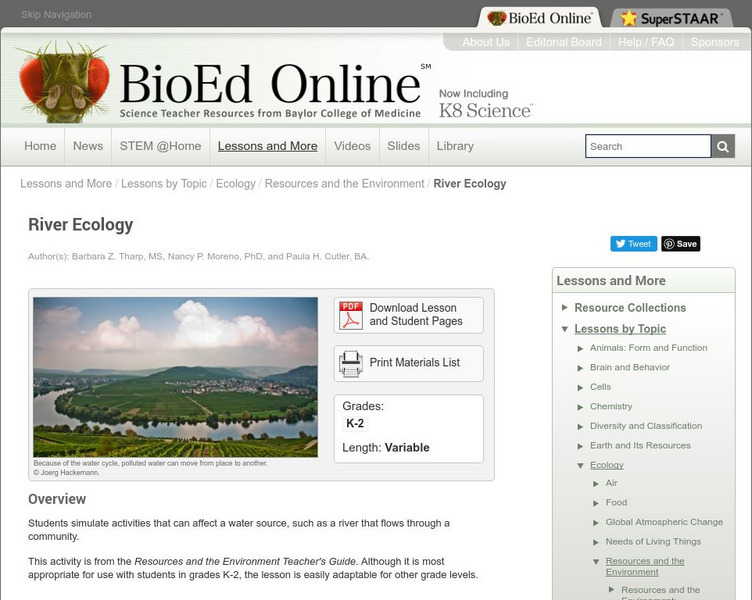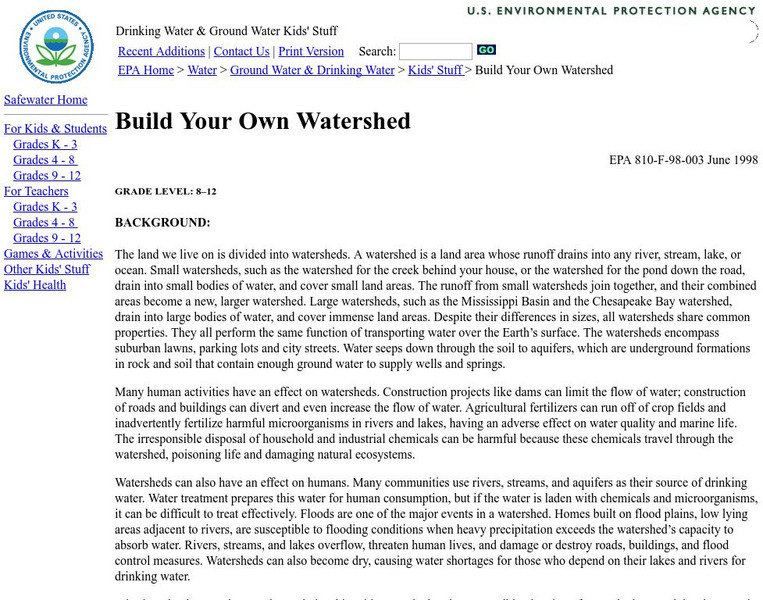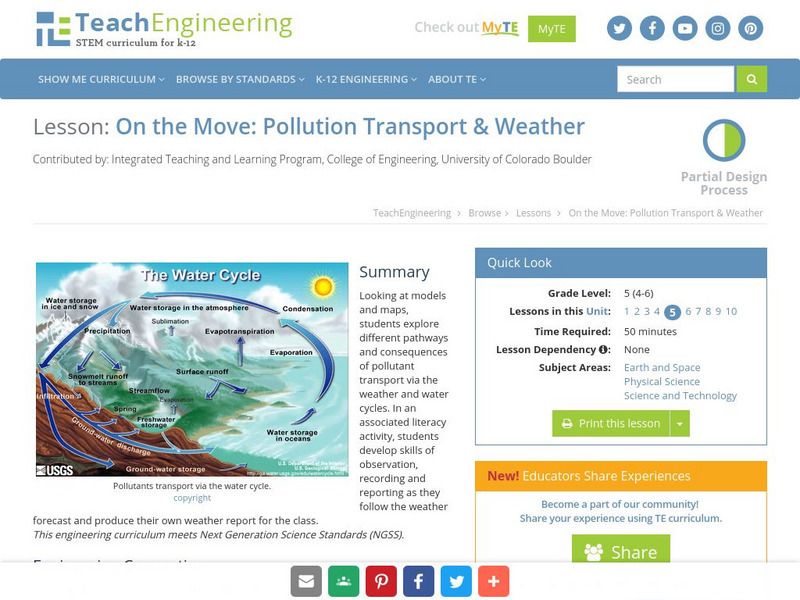Other
Fnal: Supplying Our Water Needs
A cross-curricular lesson working out needs of a town where fish are dying in the local waters, how can water be purified, how daily activities impact the water supply, and what role does chemistry play in the way individuals use water...
US Geological Survey
Lake Pontchartrain Basin Foundation: Liquid Assets: Our Water Resources
Lessons designed to show students how water quality, water pollution, and personal lifestyle are related. Lessons help students understand the importance of our water resources and water quality. Students will explore the nonpoint and...
HotChalk
Hot Chalk: Lesson Plans Page: Causes of Pollution
This lesson plan is designed to teach young children identify the types of pollution, the sources of the pollution, and how they can protect the environment from further pollutants.
Science Education Resource Center at Carleton College
Serc: Investigating Aquatic Ecosystems: Macroinvertebrates and Water Quality
Young scholars will investigate three aquatic ecosystems (pond, stream, bog) to determine the relative pollution index and the water quality of each ecosystem. They will collect and analyze the benthic organisms found in each system and...
Science Education Resource Center at Carleton College
Serc: Healthy Waters
By the end of this lesson, young scholars will understand how we can use macroinvertebrates to determine the quality of water in a river or stream.
Science Education Resource Center at Carleton College
Serc: Water Sheds and Water Quality
Included here is a collection of activities to teach students about watersheds and pollution.
Science Education Resource Center at Carleton College
Serc: Mn Step: Water Runoff: How the Ground Water in Your Community Is Affected
After creating a model, students will investigate factors that affect water runoff both positively and negatively, and the impact this has on the quality of groundwater.
Texas Commission on Environmental Quality
Tceq: Lesson Plans & Resources for Teaching Environmental Sciences [Pdf]
A large collection of lesson plans on environmental topics. The lessons are broken up into the broad categories of air, water, and waste, and look at issues around quality, pollution, conservation, and recycling. There are activities for...
Nature Conservancy
The Nature Conservancy: Gardens Activity Guide: Water
In this guide helps students understand their garden as a model watershed through the collection and analysis of rainwater filtration data.[4.06]
BioEd Online
Bio Ed Online: River Ecology
In this lesson plan students are required to simulate activities that can affect a water source, such a river as it flows from one place to another within a community.
Science Education Resource Center at Carleton College
Serc: Investigating Ponds and Streams: How Clean Is Our Water?
In this field lab, students investigate the differences in three city ponds. Students will compare pond life, temperature, pH, Ammonia, dissolved oxygen, and Nitrate. The student use the pond sheets (Flinn Scientific Catalog 2007) to...
Science Education Resource Center at Carleton College
Serc: Using Benthic Marcoinvertebrates to Determine Biodiversity in a River
In this investigation of macroinvertebrates, learners will build rock baskets and place them in various parts of a river to collect insects. Students will group insects according to their pollution tolerance and use the PTI to determine...
US Environmental Protection Agency
Epa: Build Your Own Watershed
How can you learn to build your own watershed? This site features an activity to illustrate the basic properties of a watershed. Don't miss out.
Environmental Education for Kids
Eek!: Teacher Resources: Groundwater Study Guide [Pdf]
This study guide is designed to help students begin thinking about groundwater - where it comes from, why it's important, and how it can be conserved and protected. The guide includes a brief overview of groundwater, a glossary, and...
Science Education Resource Center at Carleton College
Serc: Investigate Effects of an Oil Spill
This lab is designed so that learners will understand the effects of oil spills on plants, animals, and the environment and investigate clean up methods through a simulated oil spill. They will understand the risks associated with...
American Geosciences Institute
American Geosciences Institute: Earth Science Week: Freddy the Fish
Explore how pollution can affect natural organisms and habitats.
The Franklin Institute
The Franklin Institute Online: Slick Sea Spills
Use this site to promote environmental awareness in your classroom with this instructional activity on the effects of oil spills on water habitats.
TeachEngineering
Teach Engineering: On the Move
Looking at models and maps, students explore different pathways and consequences of pollutant transport via the weather and water cycles. In an associated literacy activity, students develop skills of observation, recording and reporting...
American Geosciences Institute
American Geosciences Institute: Earth Science Week: Hands on Experiments to Test for Acid Mine Drainage
Fifteen short experiments which test acid mine damage to the streams, rivers, and creek ecosystems surrounding it.
Science Education Resource Center at Carleton College
Serc: Can We Revive Lake Erie's "Dead Zone?"
This Ohio Sea Grant website features a WebQuest-like activity that explores the development of a dead zone, an oxygen-deprived area where there is no life, in Lake Erie. The activity aims to teach students about the processes that...
US National Archives
Docsteach: Birth of the Environmental Protection Agency (Epa)
By the late 1960s, issues of unchecked land development, urban decay, and air, noise, and water pollution came to Americans' attention. In November 1971, the newly created Environmental Protection Agency (EPA) announced a large-scale...
TeachEngineering
Teach Engineering: Oil Spill
This activity will allow students to explore an important role of environmental engineers: cleaning the environment. Students will learn details about the Exxon Valdez oil spill, which was one of the most publicized and studied...
Science Education Resource Center at Carleton College
Serc: Mn Step: Watersheds Urban and Rural
For this activity students build models of two types of watersheds, one urban and one rural. They will then simulate rain or the water cycle and observe what happens to the 'soil.' This activity leads to discussions about the water...
Science Education Resource Center at Carleton College
Serc: Ecosystem Study
Studets investigate the health of an ecosystem and the effects of water, sunlight, nutrients or pollutants. They determine the change in the environment through observation, journaling, and measuring growth of the plants and living...






















